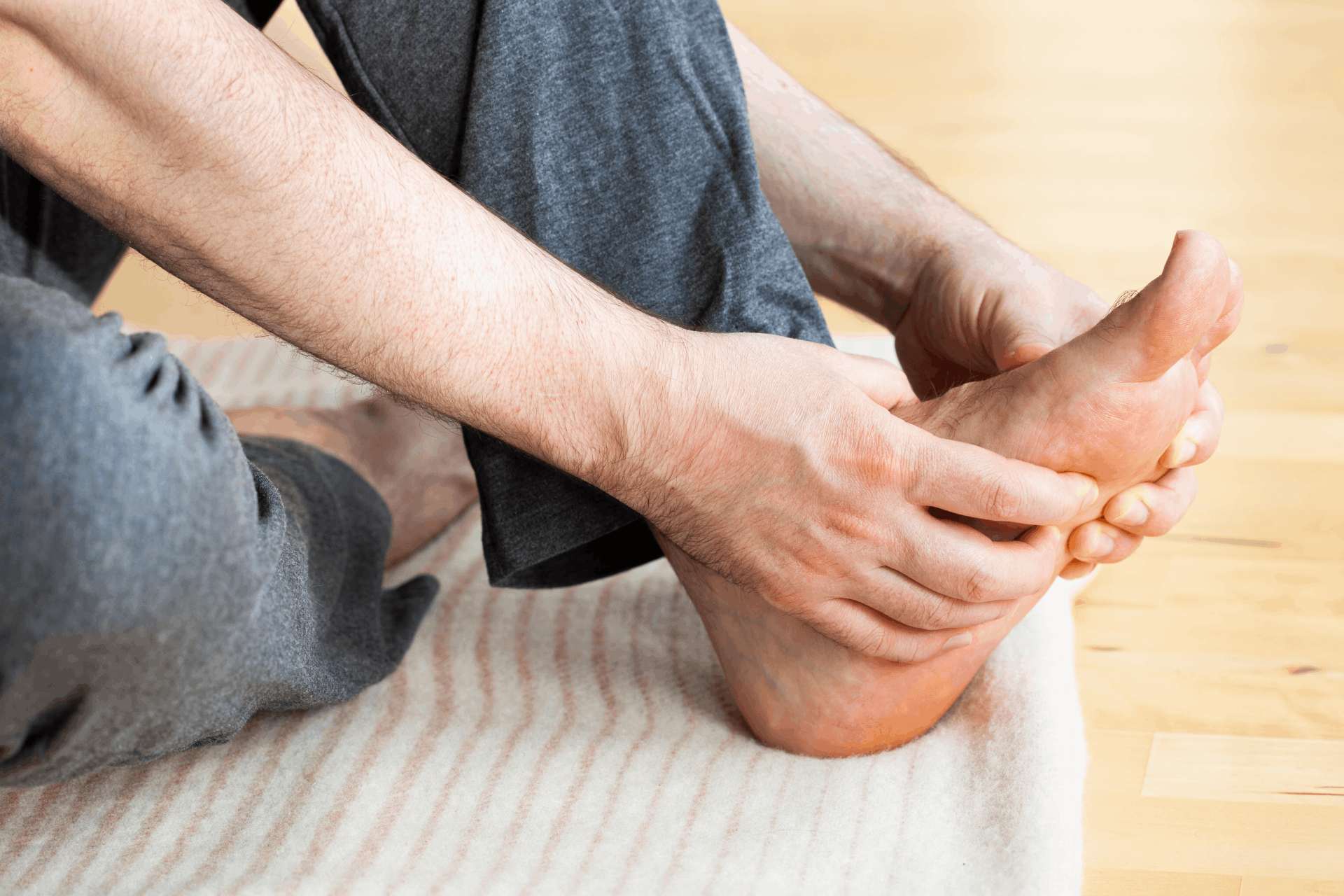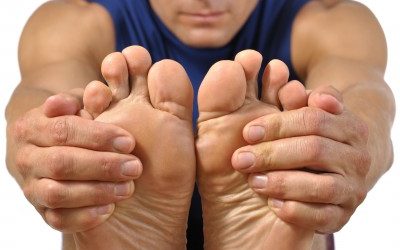Plantar fasciitis is common repetitive strain injury that can cause excruciating foot pain. Plantar fasciitis means inflammation to your plantar fascia, the thick strong band of connective tissue that runs from your heel to the start of your toes forming the arch of the foot.
 Foot pain is the main symptom, which can be dull or sharp. This is usually felt on the bottom of the inner aspect of the heel and/or arch of the foot. It may develop slowly over time, or suddenly after intense activity.
Foot pain is the main symptom, which can be dull or sharp. This is usually felt on the bottom of the inner aspect of the heel and/or arch of the foot. It may develop slowly over time, or suddenly after intense activity.
Foot pain is often worst when you take your first steps in the morning, or after long periods of non-weight bearing. Gentle exercise may ease things a little as the day goes, but a long walk or being on your feet for a long time often makes the pain worse. Resting your foot usually eases the pain. Sudden stretching of the sole of your foot may make the pain worse – for example, walking up stairs or on tiptoes. You may also limp because of pain.
The main purpose of the plantar fascia is to support the arch of the foot and assist in the movement of the foot.
So…What causes plantar fasciitis?
Repetitive stress and strain placed through the foot and over stretching of the plantar fascia causes micro-tears to the connective tissue of the foot. This causes scar tissue to develop. Scar tissue is non-elastic and makes the plantar fascia stiff and painful.
Contributory factors include:
Flat feet or high arches.
Tightness in the leg muscles (hamstring or calf) or Achilles tendon.
Repetitive foot use, such as walking, running & dancing on hard surfaces.
Excessive exercise or sudden increase in intensity or duration.
Being overweight.
Poorly cushioned or unsupportive footwear with no arch support.
Being on your feet for long periods.
What’s the treatment for plantar fasciitis?
Plantar fasciitis can be difficult to treat if not looked after properly.
In some case the pain may ease with time. This can take several months or more. However, in many cases the following appropriate advice together with hands-on treatment may be necessary to help assist and speed up recovery. Here are some useful tips and advice to help your self:
REGULARLY REST YOUR FOOT – avoid excessive walking, running or standing.
WEAR APPROPRIATE FOOTWEAR – avoid walking in barefoot on hard surfaces. Make sure your footwear is well cushioned with good arch support.
HEEL PADS & ARCH SUPPORTS CAN HELP – The aim of the heel pad is to cushion the heel. The aim of the arch support is to reduce the stress going through the sole of your foot. To keep things balanced ensure you should wear these in both shoes.
ICE PACKING – frozen peas wrapped in a towel held on your foot for 15-20 minutes can help reduce the inflammation and numb the pain.
PAIN RELIEF & ANTI-INFLAMMATORY MEDICATION – over the counter painkillers such as Paracetomol can help ease the pain. Ibuprofen can help reduce the inflammation as well as pain. Anti-inflammatory gels are also available. Please check with your pharmacist or GP if you are unsure about taking any of these medications.
SPECIFIC EXERCISE – most sufferers have a lot of tightness in their Achilles tendon so gentle stretching of the calf and plantar fascia several times throughout the day can help. Below are a few example exercises you can try.
CALF STRETCH
- Stand wi
 th one leg in front of the other, with both feet pointed forward. Place hands on a wall.
th one leg in front of the other, with both feet pointed forward. Place hands on a wall. - Keep back knee straight, with the heel pressed to the floor
- Push your hips forward, while pressing your back heel to the ground.
- Hold the stretch for 30 seconds.
- Repeat 3 times on each leg.
PLANTAR FASCIA MASSAGE
This is best done sitting down.
Place a tennis ball under the sole of your foot.
Gently Roll the ball up and down the inside arch of the foot for just a few minutes.
You may feel a little tenderness so it is very important that you are gentle. This will help stretch the plantar fascia and release the tight spots in the foot.
GET HELP – Seeking help from your local Osteopath will help diagnose your problem. As Osteopaths, we will look at the structure of your body and work out the cause of your problem, as it may be a muscular imbalance that has led you to developing this condition. By addressing these imbalances using Osteopathic techniques (refer to What does Osteopathic Treatment Involve in our FAQ section), not only should it help your symptoms, but it is highly likely that it will prevent the issue from reoccurring. We will also give you specific advice on how to adapt your lifestyle and exercise in order to assist in your recovery.
Prevention is better than cure!
However, there are certain things that you can do to try to prevent plantar fasciitis, especially if you have had it before. These include:
- Regularly changing training shoes used for running or walking.
- Wearing shoes with good cushioning in the heels and good arch support.
- Losing weight if you are overweight.
- Warming-up properly before and after exercise.
- Regularly stretching the plantar fascia, calf and Achilles tendon, especially before exercise.
- Avoiding exercising on hard surfaces.
If you would like more information and advice please contact the team at Cheadle Osteopathy on 0161 478 1877 or email us on info@cheadleosteopathy.co.uk
Remember not just backs!
References
https://www.heel-that-pain.com/plantar_fascia/
https://www.patient.co.uk/health/plantar-fasciitis
https://orthopedics.about.com/od/footankle/a/fasciitis.htm
https://www.nlm.nih.gov/medlineplus/ency/article/007021.htm
Diagrams
https://www.livefortheoutdoors.com/Answers/Search-results/Health–fitness/Any-advice-for-curing-Plantar-Fasciitis/
https://www.bodyandsoul.com.au/fitness/workouts/stretching+for+runners,18665
https://neelanjan-banerjee.blogspot.co.uk/2013/03/tips-to-beat-plantar-fasciitis.html




